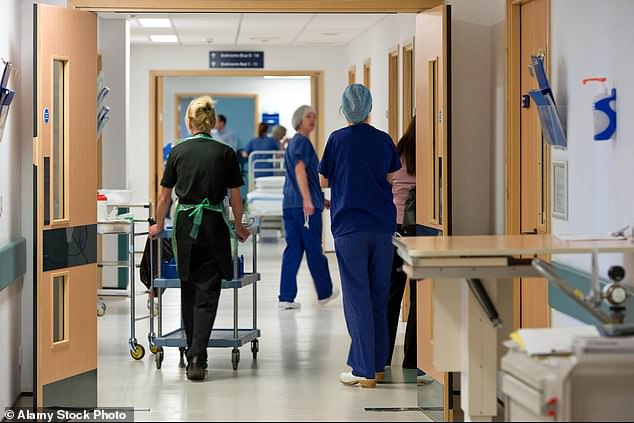Revealed: 28 NHS patients have died after bungling hospital staff wrongly looped patients’ feeding tubes into their lungs
- EXCLUSIVE: 145 incidents recorded over the last five years – with 28 fatal
- NHS classifies such accidents as ‘never events’, which should be avoidable
Nearly 30 patients have died after blundering NHS staff misplaced feeding tubes into their airways, MailOnline can reveal.
Over the past five years, 145 incidents of wrongly inserted nasogastric tubes have been officially recorded by hospitals in England. Twenty-eight ended in death.
Patients who have difficulty swallowing, such as stroke victims, can be fed or given medication through plastic tubes that go up the nose, and then loop down into the stomach.
In extremely rare cases, medics mistakenly place the tube into the patient’s airways, which can cause them to slowly drown as fluids seep into their lungs.
The NHS classifies such accidents as ‘never events’, meaning they should be totally avoidable if protocol is followed.

Although half of NHS Trusts in England reported zero incidents over the last five years, the so-called ‘never event’ happened seven times at Barts Health, seven times at United Lincolnshire Hospitals and six times at Lancashire Teaching Hospitals.
Recent NHS incident reports for these mistakes that were accessed under Freedom of Information detail how the medical blunders have led to patients being injured by misplaced nasogastric tubes.
One incident saw a stroke patient receive 300ml of feed into their lung after staff confused an earlier X-ray for the most recent one, wrongly concluding the tube was properly inserted.
‘Large volumes of blood-stained fluid’ had to be sucked from the patient’s lungs before they eventually stabilised, the report stated.
Another incident report told of how a registered nurse misplaced a nasogastric tube into a stroke patient’s airways, causing 150mls of feed to drip into the lung over a three-hour period.
The patient deteriorated rapidly and was found to be ‘extremely short of breath and unwell’ seven hours after the tube was misplaced, with a diagnosis of ‘possible pneumonia’ registered.
Although an X-ray was carried out on the patient, the misplaced tube in their lung was only spotted after the patient had died.

Over the past five years, there were 145 incidents of wrongly inserted nasogastric tubes recorded by hospitals in England, with 28 of those cases ending in death
In a separate case, a patient was left for two days with a nasogastric tube inserted into their airways after staff failed to identify the mistake despite four X-rays having been carried out on the patient.
The tube, which was dispensing medication, caused injury to the patient’s lung when it was finally dislodged. A chest drain was inserted to undo the damage, and the patient later died of multiple organ failure.
Another report detailed how a first-year medic noted a stroke patient in ‘respiratory distress’ had a nasogastric tube which was ‘bubbling’ – a tell-tale sign it was lodged in the airways.
The feeding was stopped but the patient, who had a history of chronic renal failure and high blood pressure, died six days after the incident.
Paul Whiteing, chief executive of the charity, Action against Medical Accidents said: ‘This data, and the human stories behind each of these 145 incidents and deaths, is shocking.
‘It is vital that action is taken to ensure that the mistakes that led to these incidents are understood to minimise this happening again.
‘We understand that the NHS is under unprecedented pressure, but its vital that training and learning is not sacrificed otherwise avoidable accidents and deaths will only increase.’
An NHS spokesman said: ‘NHS staff work exceptionally hard to keep patients safe and thankfully never events are extremely rare.
‘When they do occur, NHS Trusts are required to investigate and understand what has happened, which then helps them to reduce the number of these incidents, creating even safer care for patients.’









